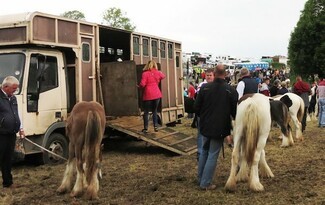Travelling horses – Help your horse on the journey to Appleby!

Anyone in the business of keeping horses knows that a horse’s good health at the end of a long journey is one of the marks of a good horseman. The skills involved are endless; from preparing the horse and vehicle before the journey, driving and checking horses on route as well as unloading and having a plan in case of an emergency. Despite the conveniences of road transportation for humans, it’s far from the natural travelling experience horses are built for.
If you can imagine the experience of travelling in the back of a lorry or trailer yourself then you are halfway towards making it a better experience for your horse. Having myself been towed in a trailer – far more unstable than a lorry - across Harlow common, I can tell you I was glad of a slow and steady driver! Fortunately I didn’t have to go far and, more importantly, I chose to get in the trailer rather than make the journey in the wet weather on foot. (Yes - I was travelling without horses before you ask!)
Horses do not have the ability to rationalise, plan and or weigh-up the pros and cons of travelling by trailer like I did, and so they tend to find the whole process a lot more stressful. Even if they don’t show stress as vocally as we do – or I did as I shrieked across the Common! - researchers have measured indicators like heart rate and hormone levels to gauge stress in horses and they’ve confirmed that travelling is a very stressful experience for horses. Shut in a dark box, without sure footing and no route of escape, it’s easy to understand why!
If horses have to be transported alone you might consider securing a plastic stable mirror to the wall.

Even horses that are transported regularly are stressed physically, if not both physically and mentally. Stress can have serious impact on their health by lowering immunity and making them more vulnerable to infection. The last thing you want is for a perfectly healthy horse at the beginning of the journey to arrive unfit for work or for sale. For example, a horse that carries the strangles bacteria which can appear healthy in all other ways may begin shedding the disease due to stress. This can lead to it infecting other horses at cost to their owner.
Shipping Fever, albeit less common, is a potentially fatal form of pneumonia in horses that can develop during transport. However the risks can be minimised through simple steps that help prevent lots of other health problems that lorry and trailer transportation can contribute to:
Horses should:
- Be well rested and fit before travel – bear weight evenly on all four legs and if pregnant not be nearing full-term
- Have had consistent access to fresh water before the journey
- Have breaks during long journeys and allow heads to lower below the chest level
- Be transported in a well-ventilated vehicle; fresh air, plenty of headroom, and not overstocked
- Have the level of ventilation adapted depending on their needs e.g. increase fresh air on hot days – especially when the vehicle is stationary and can overheat or reduce ventilation in extremely cold conditions - especially if the horse’s body temperature is very high such as after exercise. These are physical stressors that take their toll on the body’s immune system.
Beyond ensuring the health of horses, horsemanship skills are never more on display than when loading and unloading. When horses are loaded and unloaded happily or when an owner copes calmly with a difficult horse its true testament to the knowledge, understanding and expertise of an experienced horseman. Avoiding a negative experience loading into a trailer is important too if the horse is to be expected to be handled by different people and loaded safely – in effect increasing its potential sale value.
One less obvious skill related to transporting horses is knowing when not to travel, before transporting any horse. For example when it’s infectious with a contagious disease (e.g. strangles or equine flu) or if the horse has an injury, is lame and cannot bear weight on all four legs evenly - very important for compensating for corners it doesn’t know are coming! – or is pregnant and close to giving birth.
A practical photographic guide has been produced recently to assess if a horse is fit for travel.
If you have any questions about anything related to transporting horses or horse health issue, why not send them in for us to respond to in a future blog or comment on social media? Alternatively you can find us at a horse fair and ask a Redwings Vet for advice.
Look forward to meeting as many people at Appleby as I can. I’ll be keen to collect suggestions for the next blog!